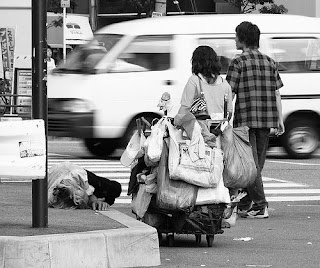 A definition of sustainability is:
A definition of sustainability is:The ability to meet present needs without compromising those of future generations. It relates to the continuity of economic, social, institutional and environmental aspects of human society, as well as the non-human environment. (accoring to CN)
Similar explanation of Sustainability is: Meeting the needs of the present without compromising the ability of future generations to meet their own needs. (America Friends Committee)
Both definitions despite varying contain a similar element that sustainability is about preservation of resources our generation has for the future, without compromise to our current way of life.
With sustainability such a broad term it takes a break down of the components to understand how it can be applied to everyday life for individuals. This is in three parts: Economic, Environmental and Social sustainability. The ways in which each section is to be tackled it out lined in Agenda 21.
The ways in which these Firstly sustainability is about the economy; this is through such targets as to combat poverty, promoting sustainable human settlements, changing consumption patterns, protecting and promoting human health conditions and integrating environment and development in decision-making.
For environmental sustainability this is through a variety of targets such as: protection of the atmosphere, integrated approach to the planning and management of land resources, combating deforestation, managing fragile ecosystems: combating desertification and drought, managing fragile ecosystems: sustainable mountain development, promoting sustainable agriculture and rural development, conservation of biological diversity and many others.
For the social side of sustainability it includes things such as global action for women towards sustainable and equitable development, Children and youth in sustainable development, recognizing and strengthening the role of indigenous people and their communities, strengthening the role of workers and their trade unions and several other targets.
However are these targets viewed as a little unachievable, as there are so many targets to achieve which take a huge amount of resources and money to set up, as well as difficulty in determining how to tackle these issues. An example of this is the aim to tackle poverty. With more than 80% of the world’s population lives in countries where income differentials are widening. According to UNICEF, 25,000 children die each day due to poverty. And they “die quietly in some of the poorest villages on earth, far removed from the scrutiny and the conscience of the world. Being meek and weak in life makes these dying multitudes even more invisible in death.” Is there really enough done to tackle poverty or are we not tackling the problems correctly? (Global Issues)
The problems with securing sustainability is that it is not just thinking of short term effects on a local level such as ensuring that there is maximum recycling or optimum use of materials. But there has to be thought on a global scale to long term problems. These problems can not be addressed during one term of government, with changes of priority every time there is a shift in power there is no possibility that projects to achieve long term goals will be continued.
Another difficulty in achieving sustainability is that with continual turmoil of relations between countries not universal goal will be defined. An example of this is that in the G8 meetings 2008, when the richest Countries in the world meet up, Oxfam International Executive Director Jeremy Hobbs was quoted as saying "in the end this summit did not deliver the breakthroughs that are so urgently needed. The consensus reached was shallow at best, especially on climate."
With the view that “The G8 failed to rise to the challenge of a world in crisis, a world that is demanding serious action. We must see renewed leadership in September at the UN Emergency Summit on Poverty and in December in Poland at the vital UN climate talks,” Hobbs. It means that the ideal of reaching sustainability is threatened by each countries greed and hidden agenda as unanimity to one aim is not possible. (Oxfan International)
Another large threat to sustainability is MONEY. The big word which affects all, as currently the economy is struggling the government must view to tackle issues of short term bail out. This is a destruction from investing in future projects at the current time. Also many of the projects take vast sums of money e.g. the G8 summit fell short of $30 billion for 2010 promise, which could cost 5million lives. (Oxfam International)
Not only is it about money and the right goals but it is also about the attitudes towards achieving these goals. As without everyone taking part to work towards a sustainable environment. As with a culture of throwing away what does not work. Resources are not viewed with the value or care needed to ensure that our predecessors have the same opportunities.
There is also needs to be a greater emphasis on education of what we as individuals can do. As until a trip to my local recycling centre i had no idea that light bulbs had a specific bin.
In my opinion there are to many great issues obstructing the possibility of securing a sustainable future. But the ideal should not be given up on as there is still a possibility of achievement.
Oxfam International (2008), Pressure piled on the UN now as G8 leaders fail to rise to the challenge of a world in crisis, Avaliable, http://www.oxfam.org/en/pressroom/news/2008-07-09/pressure-piled-un-now-g8-leaders-fail-rise-challenge-a-world-crisis [Accessed 27.03.09]





